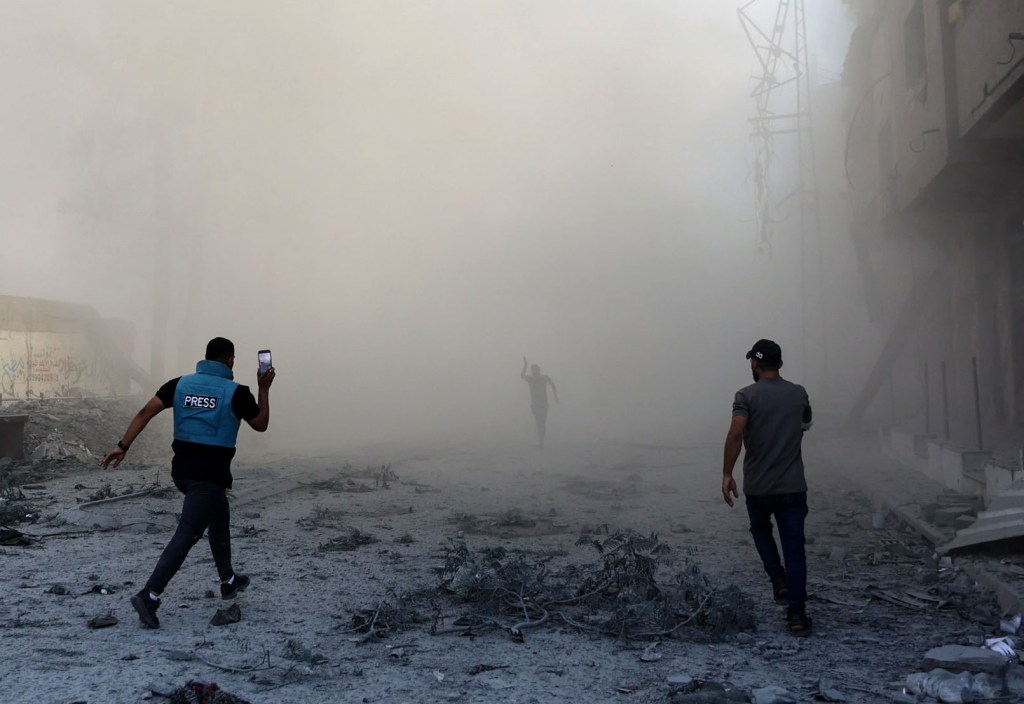One year in, Israel’s conduct of the war in Gaza has exacted an unprecedented and horrific toll on Palestinian journalists and the region’s media landscape.
At least 128 journalists and media workers, all but five of them Palestinian, have been killed – more journalists than have died in the course of any year since CPJ began documenting journalist killings in 1992. All of the killings, except two, were carried out by Israeli forces. CPJ has found that at least five journalists were specifically targeted by Israel for their work and is investigating at least 10 more cases of deliberate targeting. Two Israeli journalists were killed in the October 7, 2023, attack by Hamas.
The killings, along with censorship, arrests, the continued ban on independent media access into Gaza, persistent internet shutdowns, the destruction of media outlets, and displacement of the Gaza media community, have severely restricted reporting on the war and hampered documentation. However, as of October 9, 2024, CPJ’s research was able to confirm the following:
Unprecedented numbers of killed journalists
128 journalists killed
At least 128 journalists and media workers have been killed since the war began.
These 128 killings include:
123
Palestinian journalists and media workers, in addition to three Lebanese and two Israeli journalists.
11%
of those killed were female, and the majority of all killed were under 40 years old.
75%
of Palestinians were killed by Israeli airstrikes; the rest were killed by other types of fire, including drone strikes, tank fire, shootings, and fire of unknown type.
5
At least five of the killings were targeted murders of journalists by the IDF, four in Gaza and one in Lebanon.
3
of the murdered journalists targeted were wearing press insignia at the time they were killed.
More journalists and media workers have died in the Israel-Gaza war than in any other year since CPJ began documenting journalist killings in 1992. By comparison, 56 journalists were killed in Iraq in 2006 – the next deadliest year. The targeted or indiscriminate killing of journalists, if committed deliberately or recklessly, is a war crime.
CPJ is investigating at least 10 additional cases where the IDF may have specifically targeted the journalists. (See below for an explanation of how CPJ defines “murder” in its methodology.)
Arrests and allegations of torture of detained journalists
69 Palestinian journalists arrested
Since the war, at least 69 Palestinian journalists have been arrested; Israel arrested 66, and Palestinian authorities arrested three.
43
Palestinian journalists remain detained by Israel.
Of this record number being imprisoned:
Most
were detained by Israel in the West Bank and held without charge under Israel’s administrative detention law, which allows for indefinite renewal of detention orders.
10
of the 43 journalists still in custody are being held under this law.
5
CPJ has documented cases of five journalists alleging torture and mistreatment while imprisoned.
On a per capita basis, Israeli authorities now hold the highest number of detained journalists in the world in a given year over the past two decades, followed by Turkey, Iran, and China. There are numerous accounts of Israeli-held journalists being subjected to violence, humiliation, and mistreatment during their detention.
Censorship and blocked access to Gaza
4,000
Estimated number of international journalists accredited by Israel to cover the war.
1
Number of international journalists able to enter Gaza to independently cover the war since October 7.
70+
Number of news outlets and civil society organizations that have urged Israel to grant independent access to Gaza
70
Approximate number of press facilities that the Palestinian Journalists’ Syndicate reported have been destroyed in the war.
5+
Number of media offices shut down permanently or temporarily by Israel.
In Israel, press freedom has been curtailed by the passage of a new law that empowers the government to ban media outlets, an increasing number of banned articles, government officials’ anti-press rhetoric, alleged attempts to control news outlets, and attacks on both international and local reporters in the West Bank and Israel, among other threats.
Impunity and lack of accountability
Zero
Members of the IDF held to account for killing, targeting, attacking, or abusing journalists
Unknown
Number of investigations underway into the killing of journalists or other alleged war crimes by the IDF, due to the IDF’s lack of transparency about the status of investigations.
CPJ methodology
CPJ uses a variety of research methods to determine whether someone meets our criteria for inclusion in our databases of killed and jailed journalists. This includes internet-based research on the individual’s output; phone or email interviews conducted with family members, friends, and colleagues, and requests for information from relevant authorities. We require at least two independent sources on any information we publish. This methodology can mean that our numbers may differ from other sources at any given time.
CPJ only classifies someone as having been murdered when CPJ is able to determine with reasonable certainty that someone has been killed deliberately in relation to their journalistic work. This methodology is longstanding and is applied globally. Other designations should not be taken to indicate that the person was killed lawfully.
Editor’s note: This report has been updated as of October 23, 2024 to correct the number of journalists wearing press insignia at the time of their murders.
